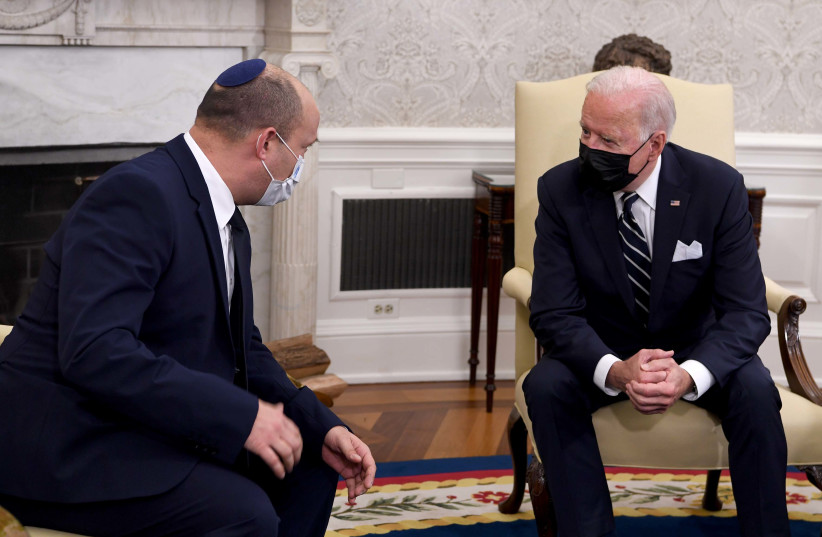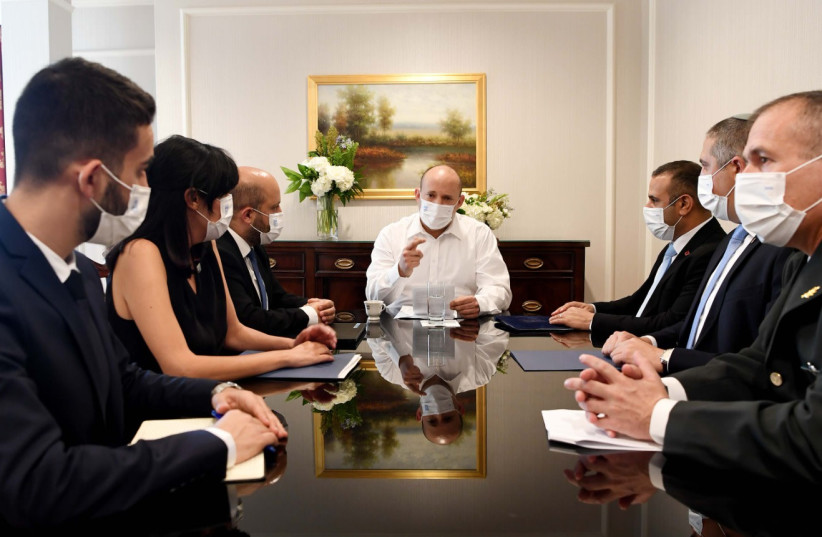Bennett said after the meeting that the atmosphere was “excellent,” that he felt Biden and his top brass was open to listening to what he had to say, and he can now call Biden directly.
LAHAV HARKOV
AUGUST 28, 2021 07:07

WASHINGTON – Prime Minister Naftali Bennett was able to start Shabbat with the satisfaction that he accomplished much of what he set out to do on his trip to Washington this week.
There were some curveballs thrown his way – after all, the plan was for him to be home with his family in Ra’anana for Shabbat and not at a hotel near the White House – but he still managed to check off every box on his public to-do list.
Bennett had seven or eight items on that list but only made four of them public.
cnxps.cmd.push(function () { cnxps({ playerId: ’36af7c51-0caf-4741-9824-2c941fc6c17b’ }).render(‘4c4d856e0e6f4e3d808bbc1715e132f6’); });
First, Bennett wanted to create a positive, unmediated connection between himself and US President Joe Biden.
That was probably the easiest one. Both sides wanted to, at the very least, show that the US-Israel relationship is on track and doing well in the post-Netanyahu, post-Trump era. They held a 50-minute one-on-one meeting, which, unusually, took place over tea in Biden’s private dining room off of the Oval Office.
Biden said in their photo-op in the Oval Office that they’re already “close friends,” and that they bonded talking about rides on Amtrak trains. In their meeting, Bennett shared a story of how his father, Jim, had been arrested in the 1960s at a sit-in against a hotel in California that would not accept Black patrons.
Bennett said after the meeting that the atmosphere was “excellent,” that he felt Biden and his top brass was open to listening to what he had to say, and he can now call Biden directly. He also invited Biden to visit Israel.
We can see how committed Biden was to this goal, too, in the fact that he barely brought up the Palestinians, which is the area in which he and Bennett most disagree. Even behind the scenes, diplomatic sources say, settlements – which the Biden administration strongly opposes – and an American consulate to the Palestinians in Jerusalem – which Bennett strongly opposes – took a very small amount of their time. The impending evictions in Sheikh Jarrah didn’t arise at all.
The second goal was not too hard, either, but there may be challenges ahead. Bennett sought to get a commitment from the Biden administration to $1 billion in aid to replenish Israel’s Iron Dome missile defense batteries. Biden already said he would help Israel on that front in the immediate aftermath of Operation Guardian of the Walls in May before Bennett became prime minister, but the details needed to be worked out. Bennett got a public “yes” on this front from Secretary of Defense Lloyd Austin on Wednesday, but Biden repeated it.
Now, the aid has to be approved by Congress. It should not be a difficult item for the administration to get approved, but you never know.
The next goal was progress on Israel joining the US Visa Waiver Program, which would allow Israelis to visit the US and vice-versa without a visa. Israel has sought this for decades, to no avail, because too many Israeli visa requests are rejected, and because Israel blocks too many Americans – usually Palestinian-Americans – from entering the country.
The first issue is a cultural one; many Israelis in their early 20s want to travel to the US on a post-army trip, but the Americans will not approve a visa for someone that age who is not able to support him or herself. The second is something Israel will need to address.
The Israeli side felt that this was getting stuck because there was no push from the top echelons. Bennett and his staff emphasized that this is something the Biden administration can do for the Israeli people, that many average Israelis will be excited about. Biden and US Secretary of State Antony Blinken said in their public remarks that they would advance it.
However, Bennett’s declaration of a victory on this front is premature. Yes, there is now a push from the President of the United States for a visa waiver for Israelis, but there would there is a long road ahead. There would likely need to be an amendment to the law to allow young, post-army, underemployed Israelis to get visas.
Bennett’s final goal was the biggest one: to get himself and Biden aligned on Iran. The deliverable that he and his advisers set out publicly before the meeting was to get Biden to go from his statement when President Reuven Rivlin visited that “not on my watch” will Iran get a nuclear weapon, to say that Iran will never do so. The prime minister got that, and then some.

“We are going to discuss the threat from Iran and our commitment to ensure Iran never develops a nuclear weapon,” Biden said to the media in the Oval Office, and then obliquely referred to a military option against Iran: “We’re putting diplomacy first and seeing where that takes us. But if diplomacy fails, we’re ready to turn to other options.”
But on a topic like Iran, there is far more that is hidden from the public eye. Bennett said he and Biden agreed on the goals – that Iran never attains a nuclear weapon and to roll back the Islamic Republic’s malign behavior across the Middle East – and that they will work “to develop the channels of cooperation,” but not if they agreed on how to reach that goal.
Diplomatic sources have called Bennett’s approach “death by 1,000 cuts,” and compared it to the Cold War, with Israel playing the role of the US and Iran being the Soviet Union. Israel has already started in that vein, so it doesn’t need Biden’s approval, per se, but it would like its cooperation and support very much.
Despite the major distraction for the Biden administration, with the terrorist attack in the Kabul airport that killed dozens, including over 10 Americans, pushing off the meeting by a day, a diplomatic source said the president and his top advisers in the meeting were all very focused on Israel and knowledgeable about its issues.
They were also appreciative of Bennett and his teams’ flexibility and willingness to change their plans and stay in Washington over the weekend.
While no one in the Biden administration said as much, it certainly didn’t hurt to have the leader of an American ally stand next to Biden after the Afghanistan fiasco, which many see as a betrayal of the pro-American Afghan armed forces, and say that Israel stands with the US, and the US has always stood with Israel.
When Bennett left for Washington on Tuesday, he set achievable goals for himself. When he lands in Israel on Sunday, he can say he attained all of them.
But the way he and Biden will address the existential threat of Iran together will remain to be seen.
Content retrieved from: https://www.jpost.com/american-politics/bennett-checked-off-all-his-boxes-in-washington-analysis-677930.